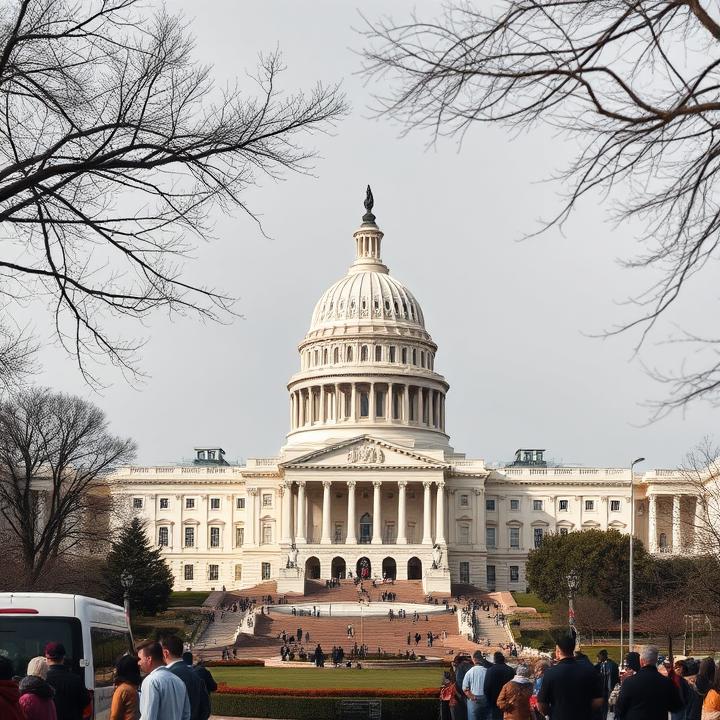
A key U.S. government office tasked with overseeing AI safety is at risk of being dismantled unless Congress acts to reauthorize it, raising concerns about the nation’s preparedness for managing the risks associated with artificial intelligence.
As artificial intelligence (AI) continues to rapidly evolve, governments worldwide are grappling with how to regulate and ensure the safe deployment of these powerful technologies. In the United States, one of the few federal offices explicitly dedicated to assessing and mitigating AI risks is now facing an existential threat. Without renewed authorization from Congress, this office—critical to shaping the nation’s AI safety policies—could be dismantled, leaving a significant gap in oversight and regulatory efforts.
The potential shutdown comes at a time when AI safety is becoming a top priority for policymakers, technologists, and the public alike. The office in question plays a vital role in evaluating AI risks, advising government agencies, and helping craft regulations aimed at ensuring responsible AI development. This article explores the consequences of losing this office and the broader implications for AI governance in the U.S.
1. Overview: The Importance of AI Safety Oversight
AI technologies have become integral to various sectors, from healthcare and finance to national security and public services. However, with their increasing prevalence comes a host of risks, including biased algorithms, data privacy concerns, and the potential misuse of AI in critical infrastructure or military applications. This has led to growing calls for AI safety oversight at the federal level to ensure that these technologies are deployed responsibly and ethically.
The Role of the AI Safety Office
The government office currently in jeopardy was established to provide the federal government with technical expertise on AI safety, risk mitigation, and the development of policies aimed at regulating AI systems. Its core responsibilities include:
- Assessing AI Risks: Identifying potential dangers related to AI, such as algorithmic bias, cybersecurity threats, and unintended consequences in critical systems.
- Providing Guidance to Government Agencies: Helping federal agencies understand how to safely adopt and implement AI technologies in their operations.
- Shaping AI Policy: Advising lawmakers and government bodies on AI regulations, ensuring that the United States remains at the forefront of responsible AI development.
- Fostering International Collaboration: Engaging with global counterparts to coordinate AI safety efforts and promote shared best practices in AI governance.
This office has been instrumental in shaping the early stages of AI governance in the U.S. and is seen as a key player in helping the country address the ethical and safety challenges posed by AI.
2. Congressional Inaction: Why Is the Office at Risk?
The office’s future is now in doubt due to the failure of Congress to reauthorize its mandate. The initial authorization for the office was temporary, intended to allow lawmakers time to assess its effectiveness and decide whether to extend its operation. However, with mounting legislative gridlock and a lack of consensus on the role of government in AI oversight, Congress has yet to renew the office’s authorization, putting its continued existence at risk.
Budgetary and Political Challenges
Several factors have contributed to the current impasse:
- Budget Constraints: Some members of Congress have expressed concerns about the costs associated with maintaining the office, despite its relatively modest budget. In a political climate focused on reducing government spending, the office has found itself a target of budget cuts.
- Regulatory Debate: There is ongoing debate within Congress over how heavily AI should be regulated. Some lawmakers argue that additional oversight could stifle innovation, particularly in sectors like tech and defense, which are crucial to U.S. economic and national security interests. Others emphasize the need for stringent AI safety measures to prevent unintended consequences.
- Competing Priorities: Congress is juggling a range of high-profile issues, from healthcare and infrastructure to defense spending, which has left little room for discussions on the future of AI governance. Without significant political momentum, the reauthorization of the office has slipped through the cracks.
3. The Implications of Losing AI Safety Oversight
If Congress fails to reauthorize the office, the United States risks losing one of its most critical resources for AI safety and governance. The consequences could be far-reaching, affecting not only the government’s ability to regulate AI but also the country’s position as a leader in global AI development.
3.1 Increased Risk of Unchecked AI Development
Without a dedicated government office to monitor AI safety, there is a growing concern that AI technologies could be developed and deployed without adequate oversight. This could lead to:
- Unregulated AI Systems: Companies and developers may face fewer restrictions, resulting in AI systems that have not been rigorously tested for safety, fairness, or ethical considerations.
- Bias and Discrimination: Without clear guidelines and regulations, AI systems may perpetuate or exacerbate biases, particularly in areas like hiring, lending, law enforcement, and healthcare.
- National Security Concerns: The absence of AI oversight could create vulnerabilities in critical infrastructure, defense systems, and cybersecurity, where AI plays an increasingly central role.
3.2 Loss of Global AI Leadership
The U.S. has long been a global leader in AI innovation, but this leadership could be undermined by the lack of coordinated AI governance. Other nations, particularly those in Europe, have made significant strides in developing AI regulations, such as the European Union’s AI Act, which seeks to govern the use of AI in high-risk areas. If the U.S. fails to establish robust oversight mechanisms, it risks falling behind in setting global standards for AI development and safety.
3.3 Delayed Policy Development
The office plays a crucial role in advising Congress on AI policy, helping lawmakers craft laws that balance innovation with safety. Without its expertise, the development of AI regulations may be delayed, leaving gaps in critical areas like data privacy, accountability, and transparency in AI decision-making.
4. The Path Forward: What Needs to Be Done?
To prevent the dismantling of this essential office, immediate action is needed from Congress. There are several steps that lawmakers and stakeholders can take to ensure the continued existence of this AI safety office and strengthen AI governance in the U.S.
4.1 Reauthorization and Funding
Congress must prioritize the reauthorization of the AI safety office, providing it with the budget and authority it needs to continue its work. This requires bipartisan support and recognition of the importance of AI oversight for both public safety and national security.
4.2 Expanding the Office’s Role
To maximize its impact, the office could expand its mandate to include a broader focus on emerging AI technologies, such as generative AI and autonomous systems. This would ensure that the U.S. government stays ahead of new developments in AI and can respond quickly to emerging challenges.
4.3 Strengthening Public-Private Collaboration
Collaboration between the government, industry, and academia is essential to ensure that AI is developed and deployed responsibly. The office can serve as a central hub for fostering partnerships that promote responsible AI development while encouraging innovation.
A Critical Moment for AI Governance
The potential dismantling of one of the few U.S. government offices dedicated to AI safety highlights the urgency of addressing gaps in AI governance. As AI continues to shape industries and impact daily life, the need for effective oversight cannot be overstated. If Congress does not act to reauthorize the office, the U.S. could face significant risks, from unchecked AI development to losing its leadership role in the global AI landscape.
The coming months will be critical for determining whether the U.S. can rise to the challenge of governing AI responsibly or whether it will allow this key office to disappear, leaving a critical gap in its AI regulatory framework.


